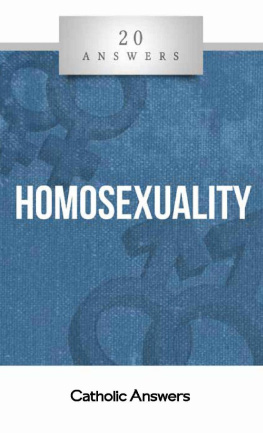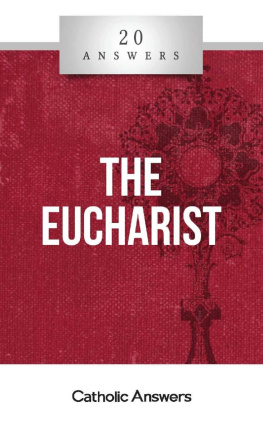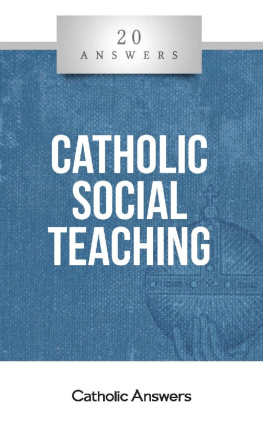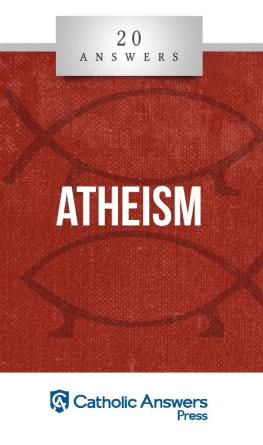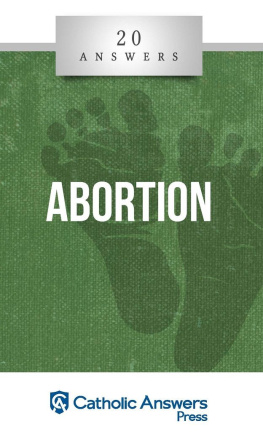Michelle Arnold - 20 Answers- Judaism (20 Answers Series from Catholic Answers Book 28)
Here you can read online Michelle Arnold - 20 Answers- Judaism (20 Answers Series from Catholic Answers Book 28) full text of the book (entire story) in english for free. Download pdf and epub, get meaning, cover and reviews about this ebook. year: 2018, publisher: Catholic Answers Press, genre: Religion. Description of the work, (preface) as well as reviews are available. Best literature library LitArk.com created for fans of good reading and offers a wide selection of genres:
Romance novel
Science fiction
Adventure
Detective
Science
History
Home and family
Prose
Art
Politics
Computer
Non-fiction
Religion
Business
Children
Humor
Choose a favorite category and find really read worthwhile books. Enjoy immersion in the world of imagination, feel the emotions of the characters or learn something new for yourself, make an fascinating discovery.

- Book:20 Answers- Judaism (20 Answers Series from Catholic Answers Book 28)
- Author:
- Publisher:Catholic Answers Press
- Genre:
- Year:2018
- Rating:3 / 5
- Favourites:Add to favourites
- Your mark:
- 60
- 1
- 2
- 3
- 4
- 5
20 Answers- Judaism (20 Answers Series from Catholic Answers Book 28): summary, description and annotation
We offer to read an annotation, description, summary or preface (depends on what the author of the book "20 Answers- Judaism (20 Answers Series from Catholic Answers Book 28)" wrote himself). If you haven't found the necessary information about the book — write in the comments, we will try to find it.
20 Answers- Judaism (20 Answers Series from Catholic Answers Book 28) — read online for free the complete book (whole text) full work
Below is the text of the book, divided by pages. System saving the place of the last page read, allows you to conveniently read the book "20 Answers- Judaism (20 Answers Series from Catholic Answers Book 28)" online for free, without having to search again every time where you left off. Put a bookmark, and you can go to the page where you finished reading at any time.
Font size:
Interval:
Bookmark:
20 Answers
Judaism
Michelle Arnold

20 Answers: Judaism
Michelle Arnold
2018 Catholic Answers
All rights reserved. Except for quotations, no part of this book may be reproduced or transmitted in any form or by any means, electronic or mechanical, including photocopying, recording, uploading to the internet, or by any information storage and retrieval system, without written permission from the publisher.
Published by Catholic Answers, Inc.
2020 Gillespie Way
El Cajon, California 92020
1-888-291-8000 orders
619-387-0042 fax
Printed in the United States of America
978-1-68357-081-3
978-1-68357-082-0 Kindle
978-1-68357-083-7 ePub
Introduction
Many Catholics have a deep interest in and appreciation for the Jewish roots of our Catholic faith. They want to know what their Jewish friends believe and why Jews do not accept Jesus as the Messiah. Some Catholics wonder if its appropriate to adopt certain Jewish practices, like lighting a menorah at Hanukkah or holding a seder meal at Passover. After all, if Jesus was a Jew, they ask, shouldnt we Catholics worship as he did? Others voice concerns about the Churchs historical relationship with the Jews. Has the Church been guilty of anti-Semitism, even sharing some responsibility for the Holocaust? Was Pius XII Hitlers Pope?
Recent popes have urged Catholic respect for Jews and Judaism. During his visit to the synagogue in Rome, St. John Paul II told the Jews gathered there for the occasion, You are our dearly beloved brothers and, in a certain way, it could be said that you are our elder brothers.
In this booklet, you will be introduced to the common beliefs and practices of Judaism, and find answers to the most common questions Catholics ask about it and the Jewish people. We will also look at the sometimes painful history of the Churchs relationship with the Jews and at the hopeful signs of peaceful dialogue and fraternity that the last three popes have urged.
1. What is Judaism?
Judaism is the oldest of the three great monotheistic religions along with Christianity and Islam (which in a sense descend from it). It began approximately 3,800 years ago as the religion of a nomadic tribe in the Middle East, possibly in what is now modern-day Iraq. The distinctive belief of Judaism, which separated it four millennia ago and continues to set it apart today, is the belief in one God who revealed himself to his people.
As recorded in Genesis, one of the foundational books of the Hebrew Bible, the founding patriarch of the Jewish people was Abraham, from Ur of the Chaldeans (Gen. 11:2831). When God called Abraham, he gave certain promises. He promised Abraham and his descendants land that he would set aside for them and their posterity (Gen. 12:1). And he promised to make a great nation from Abrahams descendants, which would in some way be a light to all of the nations (Gen. 12:23).
Although Abrahams descendants would be dispersed from this land at various times in their history, God kept bringing them back to this land even after long periods of captivity and exile.
During one such return to their land, God met with his people at Mount Sinai and gave to Moses, whom he had appointed to bring his people out of captivity in Egypt, a moral code and a covenant to bind them to himself. The code, which became known as the Ten Commandments, became the basis not just for Jewish morality but for moral law throughout Western civilization. With the covenant, God promised that the people of Israel (the name God gave to Abrahams grandson Jacob, which became the name of the land of Jacobs descendants) would become a holy nation and his own people, provided they kept the covenant.
Toward the end of his life, Moses promised Israel that God would raise up for them another leader, one like himself:
The Lord your God will raise up for you a prophet like me from among you, from your brethrenhim you shall heed.... And the Lord said to me, They have rightly said all that they have spoken. I will raise up for them a prophet like you from among their brethren; and I will put my words in his mouth, and he shall speak to them all that I command him (Deut. 18:15, 1718).
This promise developed over the centuries into an expectation of an anointed one, a Messiah, who would in some way deliver Israel from the hands of its enemies and usher in an age of peace, analogous to how Moses had delivered Israel from slavery in Egypt to peace and prosperity in the land God had given them.
In addition to the moral code and the covenant, the people of Israel wrote down their history, songs, prophecies of the coming Messiah, and calls to repentance and observance of the covenant, as well as the laws received from God for worshipping him in the temple that he commanded them to build for him. These writings were collected into the Hebrew Bible ( Tanakh ) and would influence the development of the three monotheistic religions.
After Roman soldiers destroyed the temple in A.D. 70, the Jews could no longer offer their divinely ordained animal sacrifices. With their center of worship gone, the rabbis (teachers) wrote down the vast legal codes that had guided Jewish practice for centuries and previously been passed down orally. Synagogue Other rituals, such as the seder meal at Passover in commemoration of the exodus from Egypt, would be primarily observed in Jewish homes by families rather than in a congregational setting.
Modern Judaism continues to observe the Rabbinic Judaism created after the destruction of the temple. One major difference though, is that movements have formed within modern Judaism that differ significantly from each other in their interpretation of the moral and legal codes and in how those laws ought to be observed by Jews today.
2. What is the history of Judaism?
The Jewish people trace their roots to Gods call of the patriarch Abraham in Genesis 12. God promised Abram, whom he later renamed Abraham, that God would create a great nation from him:
Now the Lord said to Abram, Go from your country and your kindred and your fathers house to the land that I will show you. And I will make of you a great nation, and I will bless you, and make your name great, so that you will be a blessing. I will bless those who bless you, and him who curses you I will curse; and by you all the families of the earth shall bless themselves (Gen. 12:13).
The word Judaism comes from Judah, the name of Abrahams great-grandson (one of the twelve sons of Jacob, also called Israel) and the name of the ancient southern kingdom of Judah, which endured for about a century after the dispersion of the northern kingdom of Israel around 720 B.C. The inhabitants of the southern kingdom and their descendants eventually became known as Jews , and their religion became known as Judaism.
In the centuries following the destruction of the second temple in Jerusalem in A.D. 70, which brought an end to the ritual animal sacrifices performed there, Jewish rabbis began to write down Jewish oral law. These writings became known as the Mishnah . Subsequent rabbinical commentaries on the Mishnah were gathered together and became known as the Talmud . These writings, together with the Tanakh, would form the basis for post-temple Rabbinic Judaism.
As Christianity and, later, Islam ascended to religious and political prominence in Europe, the Middle East, and North Africa, Jews began to suffer strict sanctions on both their religious freedom and their ability to live freely in both Christian and Muslim lands. Under the reign of Emperor Constantine, for example, conversion to Judaism became a capital offense, and intermarriage between Jews and Christians was prohibited by civil law. These legal prohibitions, among others, made it more and more difficult for Jews to live as Jews and practice Judaism outside of closed communities.
Next pageFont size:
Interval:
Bookmark:
Similar books «20 Answers- Judaism (20 Answers Series from Catholic Answers Book 28)»
Look at similar books to 20 Answers- Judaism (20 Answers Series from Catholic Answers Book 28). We have selected literature similar in name and meaning in the hope of providing readers with more options to find new, interesting, not yet read works.
Discussion, reviews of the book 20 Answers- Judaism (20 Answers Series from Catholic Answers Book 28) and just readers' own opinions. Leave your comments, write what you think about the work, its meaning or the main characters. Specify what exactly you liked and what you didn't like, and why you think so.


